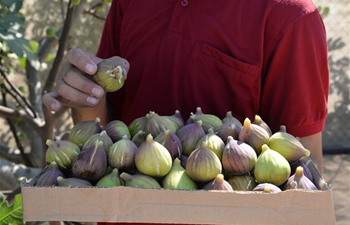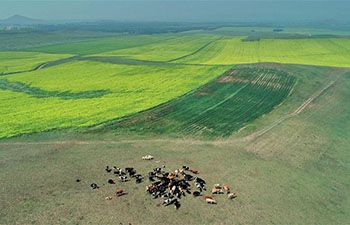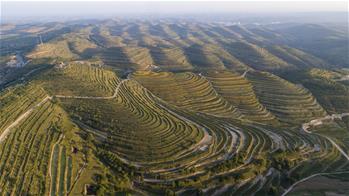KUNMING, July 30 (Xinhua) -- Coal mines may have brought environmental blues in China, but in the southwestern province of Yunnan, the exploited mines have been transformed into a gold mine of an unexpected industry: mango trees.
When Sun Shaohua was 16, he started mining coal with fellow villagers in Demao Village of Huaping County, a place once known as one of the key counties in China for churning out a large amount of coal.
"During the prime of coal mining, there were tens of thousands of people mining coal," Sun said.
Sun spent four years as a mine exploiter, 10 years transporting coal and four years detonating bombs at the mines.
"I made a lot of money from coal mining, but the environmental crisis was exacerbating," he said. "Sometimes I could not sleep well because I was worried."
After decades of exploitation, the coal mines were severely over-developed, generating a huge amount of gangue.
"If you wore new clothes and took a walk outside, the clothes could easily turn black," he said.
When it rained, there was black water everywhere. Cave-ins were frequently reported, and mudslides often struck.
MANGO INDUSTRY TAKES ROOT
As locals felt the pinch of the waning mining industry, the local government decided to bolster the economy with a green industry.
Situated near the Jinsha River, the upper reach of the Yangtze, China's longest river, Huaping County has abundant resources of light, heat and water. The geological advantages make the county quite suitable for mango cultivation.
"Back in the 1990s, the government encouraged us to grow more trees, but because the mining industry was so well developed, nobody ever paid attention," Sun said.
In 2015, with the government's encouragement, Sun started to grow mangos, but could not find a proper area for cultivation.
"I had to grow the mango trees on gangue," Sun said. "I did not hold my hopes high because I didn't think it would work."
The residue is reportedly full of minerals, which provides sufficient nutrients for the mango trees, according to a local agricultural expert.
To his surprise, Sun's mango trees blossomed the next year, and the ecstatic farmer expanded mango cultivation the third year.
The better-than-expected results excited local officials, and the county government encouraged the farmers to grow mangoes on the mining areas and over the gangue by providing subsidies and insurance for them.
Sun improved the soil quality and tried a variety of mangoes. So far, he has cultivated 9.2 hectares of mango trees, which generates an annual output value of more than 3 million yuan (436,400 U.S. dollars).
According to official figures, by the end of 2018, the mango-planting area in Huaping reached about 22,400 hectares, with 291,200 tonnes of mangoes produced each year, generating an output value of 1.98 billion yuan.
Meanwhile, the government tried to slash coal over-capacity by transforming coal mining companies into mango companies. From 2013 to 2019, the number of coal mining companies shrank from 82 to just 29.
"The mango industry not only improved the environment but also increased farmers' incomes," said Yu Lijun, secretary of the Huaping County Committee of the Communist Party of China. "The water, plants and soil are recovering from over-exploitation."
According to official figures, the forest coverage in the county has reached 72.2 percent, and water loss and soil erosion has significantly decreased along the Jinsha River. In 2018, the average disposable income of rural residents per capita in the county exceeded 12,000 yuan.
"Mango trees have born fruit above the coal mines," Yu said. "They truly transformed fortunes here."

















